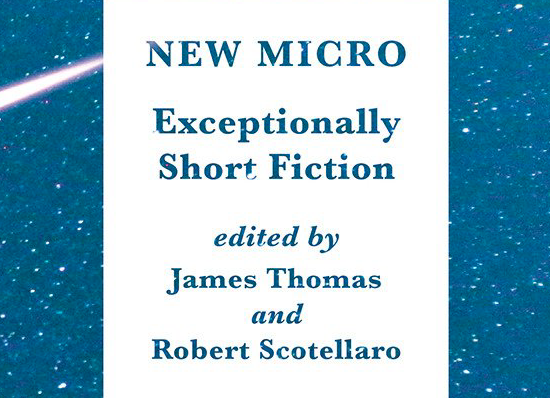In creating New Micro: Exceptionally Short Fiction (forthcoming August, 2018), editors James Thomas and Robert Scotellaro combed through print and online journals, individual collections, and literary anthologies for short gems. All of the one hundred and forty stories included in this W. W. Norton & Company anthology are individually less than three hundred words. Though brief, these narratives are deep. In the anthology’s forward, Robert Shapard notes the length of stories has been decreasing for decades because shorter forms often capture what longer forms cannot. “[A] good micro hangs in the air of the mind like an image made of smoke,” writes Shapard. They “can bring you to a point of recognition in a paragraph, then, foregoing any novelistic wind-down, leave you there suspended in that wonderful moment.”
The stories in the New Micro invite readers to fill in silences, to wrestle with mysteries, to wonder if what they’re reading is prose or poetry, narrative or lyric. Here’s a three-line look at some of Portland Review’s favorite micros from this inventive collection:
“Utilitarianism” by Tom Hazuka (Ooligan Press)
Homecoming:
my parents have mistaken
taxidermy for utility.
“Death Letter” by Zachary Schomburg (Black Ocean Press)
Different deaths
for my ex, some more
romantic than others.
“Clean” by Joy Williams (Tin House Books)
Can a carwash
wash away the blood
of a bystanding boy?
“The Cat Lover” by Thaisa Frank (Counterpoint Press)
Dreaming and
loving in
velvet and fur.
“The Illustrated Woman” by Pedro Ponce (Cow Heavy Books)
My name tattooed on her
torso would erase
this yin-yang doubt.
“Mermaid” by Claudia Smith (Rose Metal Press)
The postcard ocean is not
the gray one where
my sister now lives.
“Time for Dessert” by Robert Vaughan (Unknown Press)
Riverview, wife, peach pie
after dinner, drinks.
What more is there to need?
“This Heat” by Tara Lynn Masih (Midway Journal)
July heat reminds my husband
of jungle battles. Whenever
he leaves, I live alone with the bats.
—
Kari Davidson is an Editorial Assistant at Portland Review.

